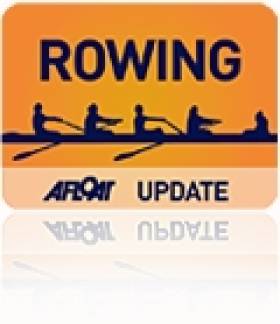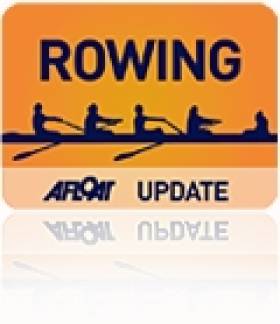Displaying items by tag: Dublin Head
Dublin Head A Dead Heat - Again
#ROWING: The Dublin Head of the River today ended in a dead heat – for the second successive year. The senior eight from Trinity and the composite crew of Commercial and Old Collegians were both timed at 11 minutes 39 seconds for the run from the Ha’penny Bridge to Islandbridge. A number of boats ran into difficulty at the bridge at Heuston Station. Last year was the first time the event had a dead heat – UCD divided the honours with a composite crew. Dublin Head of the River, Ha’penny Bridge to Islandbridge (Selected Results) Overall: 1 Trinity senior eight and Commercial/Old Collegians senior eight 11 minutes 39 seconds, 3 UCD senior eight (time only) 12:08, 4 Carlow/Three Castles senior eight 12:10, 5 Trinity intermediate eight 12:28, 6 Neptune senior eight 12:37. Men, Eight – Senior: 1 Trinity and Commercial/Gráinne Mhaol/Old Collegians 11:39, 3 Carlow/Three Castles 12:10. Intermediate: Neptune 12:28. Novice: Queen’s 13:35. Junior: Blackrock College 15:07. Masters: Commercial 13:25. Fours – Senior: Commercial (quadruple, coxed) 15:00. Intermediate: Garda 15:04. Women, Eight – Senior: UCD 14:31. Intermediate: UCD 15:55. Novice: Garda 17:11. Junior: Commercial 16:44. Fours – Senior: Trinity (time only) 18:55, 2 Neptune 21:50.
| PLACE | CREW NO | CREW NAME | Category | TIME TAKEN | MARGIN | |||
|---|---|---|---|---|---|---|---|---|
| MIN | SEC | MIN | SEC | |||||
| 1 | 1 | Dublin University Boat Club | M Senior 8 | 11 | 39,00 | 0 | 0.00 | |
| 2 | 2 | Commercial RC - Commercial RC/Grainne Mhaol/C | M Senior 8 | 11 | 39.00 | 0 | o~oo | |
| 3 | 5 | UCD BO (time only) | M Senior 8 | 12 | 8.00 | 0 | 29.00 | |
| 4 | 4 | Cadow Rowing Club - Carlow Rowing Club/Three C | M Senior 8 | 12 | 10.00 | 0 | 31.00 | |
| 5 | 6 | Dublin University Boat Club | M Inter 8 | 12 | 28.00 | 0 | 49.00 | |
| 6 | 3 | Neptune Rowing Club | M Senior 8 | 12 | 37.00 | 0 | 58.05 | |
| 7 | 8 | Commercial RC (c 387) | M Masters 8 | 13 | 25.00 | 1 | 46.00 | |
| 8 | 7 | Carlow Rowing Club | M Inter 8 | 13 | 26.00 | 1 | 47.00 | |
| 9 | 18 | Queens University Belfast Boat Club | M Novice 8 | 13 | 35.00 | 1 | 56.00 | |
| 10 | 21 | UCD BC (time only) | M Novice 8 | 13 | 49.00 | 2 | 10.00 | |
| 11 | 9 | Neptune Rowing Club - Commercial RC/Neptune RM | Masters 8 | 13 | 57.00 | 2 | 18.00 | |
| 12 | 16 | Dublin University Boat Club | M Novice 8 | 14 | 8.00 | 2 | 2900 | |
| 13 | 13 | UCD BC | W Senior 8 | 14 | 31,00 | 2 | 52.00 | |
| 14 | 19 | Dublin University Boat Club B | M Novice 8 | 14 | 46.00 | 3 | 7.00 | |
| 15 | 22 | Commercial RC 4X+ | M Senior 4 | 15 | 0.00 | 3 | 21.00 | |
| 16 | 36 | Garda Boat Club | M Inter 4 | 15 | 4.00 | 3 | 25.00 | |
| 17 | 10 | Old Collegians Boat Club (f 486) | M Masters 8 | 15 | 6.00 | 3 | 27.00 | |
| 18 | 25 | Blackrock College Rowing Club Jun 16 | M Junior 8 | 15 | 7~00 | 3 | 28.00 | |
| 19 | 14 | Dublin University Ladies Boat Club B | W Senior 8 | 15 | 29.00 | 3 | 50,00 | |
| 20 | 27 | UCD BC | W Inter 8 | 15 | 55.00 | 4 | 16.00 | |
| 21 | 38 | Commercial RC | M Inter 4 | 16 | 6.00 | 4 | 27.00 | |
| 22 | 17 | Neptune Rowing Club | M Novice 8 | 16 | 14.00 | 4 | 35.00 | |
| 23 | 39 | Blackrock College Rowing Club | M Inter 4 | 16 | 16.00 | 4 | 3700 | |
| 24 | 20 | Queens University Belfast Boat Club B | M Novice 8 | 16 | 28.00 | 4 | 49.00 | |
| 25 | 24 | Neptune Rowing Club Jun 16 | M Junior 8 | 16 | 35,00 | 4 | 56.00 | |
| 26 | 11 | Three Castles Rowing Club - City of Derry Boating | M Masters 8 | 16 | 41.00 | 5 | 2.00 | |
| 27 | 40 | Commercial RC | W Junior 8 | 16 | 44,00 | 5 | 5.00 | |
| 28 | 31 | Garda Boat Club | W Novice 8 | 17 | 11.00 | 5 | 32.00 | |
| 29 | 37 | Dublin University Boat Club B | M Inter 4 | 17 | 21.00 | 5 | 42.00 | |
| 30 | 28 | UCD BC | W Novice 8 | 17 | 24.00 | 5 | 45.00 | |
| 31 | 29 | Dublin University Laaies Boat Club | W Novice 8 | 17 | 38.6-0- | 5 | 59.00 | |
| 32 | 41 | Neptune Rowing Club | W Junior 8 | 17 | 40.00 | 6 | 1.00 | |
| 33 | 15 | Commercial RC | M Novice 8 | 17 | 53.00 | 6 | 14.00 | |
| 34 | 32 | Dublin University Ladies Boat Club B | W Novice 8 | 17 | 58.00 | 6 | 19.00 | |
| 35 | 12 | Dublin University Ladies Boat Club (time only) | W Senior 4 | 18 | 55.00 | 7 | 16.00 | |
| 36 | 35 | Dublin University Boat Club | M Inter 4 | 19 | 47.00 | 8 | 8.00 | |
| 37 | 34 | Neptune Rowing Club | W Senior 4 | 21 | 50.00 | 10 | 11.00 | |
| 38 | 30 | Queens University Belfast Ladies Boat Club | W Novice 8 | 874 | 32.00 | 862 | 53.00 | |
| 39 | 23 | Dublin University Boat Club 4X+ | M Senior 4 | 999 | 0.00 | 987 | 21.00 | |
| 40 | 26 | Commercial RC Jun 16 | M Junior 8 | 999 | 0.00 | 987 | 21.00 | |
| 41 | 33 | Queens University Belfast Ladies Boat Club B | W Novice 8 | 999 | 0.00 | 987 | 21,00 | |
| 42 | 42 | Commercial RC | W Inter 4 | 999 | 0.00 | 987 | 21.00 | |
Historic Rowing Dead Heat at Dublin Head of the River
# ROWING: The Dublin Head of the River finished in a dead heat on Saturday, the first time this has happened in exactly 60 years. A big composite crew built around the Commercial senior four and with with members of three other clubs finished with the same time as UCD in cold and clear conditions. The college crew rested their senior oarsmen for the event.
The only other dead heat in the 69 years of the event came in 1953 when UCD and Trinity dead-heated in an event which featured only nine crews. An impressive number of crews – 32 – took on the sometimes choppy water this year, but the boats set off at sometimes very long intervals, dulling some of the competitive edge.
UCD’s senior women won their battle with Trinity, covering the course from the Ha’penny Bridge to Islandbridge nine seconds faster than their rivals.
One negative note was the break-in and theft from three cars in the UCD car park.
Dublin Head of the River (Selected Results)
Overall: 1= UCD senior eight; Commercial/Grainne Mhaol/ Old Bones/University of Limerick 10 minutes 32.0 seconds; 3 UCD intermediate eight 11:02.0, 4 Trinity novice eight 11:17.0, 5 UCD intermediate eight 11:25.0, 6 Neptune junior eight 11:35.0.
Graded Results
Men, Eight – Senior: 1= UCD and Commercial/Grainne Mhaol, Old Bones/University of Limerick 10:32.0. Intermediate: 1 UCD 11:02.0, 2 UCD B 11:25.0, 3 Commercial 11:41.0. Novice: 1 Trinity 11:17.0, 2 Queen’s 11:39.0, 3 Trinity 12:09.0. Junior: 1 Neptune 11:35.0, 2 Blackrock College 12:27.0, 3 Neptune B 14:49.0.
Four – Senior: 1 Commercial B 12:35.0, 2 Commercial 31:18.0. Masters: Commercial 13:28.0. Quadruple – Novice: Trinity 13:49.0.
Women – Eight, Senior: 1 UCD 12:04.0, 2 Trinity 12:13.0. Intermediate: 1 Commercial 12:56.0, 2 UCD 12:58.0. Novice: 1 UCD 13:34.0, 2 Trinity 13:57.0, 3 Trinity B 14:08.0. Junior: 1 Commercial 14:00.0, 2 Commercial B 15:33.0.
Four – Senior: Trinity 14:47.0.































































